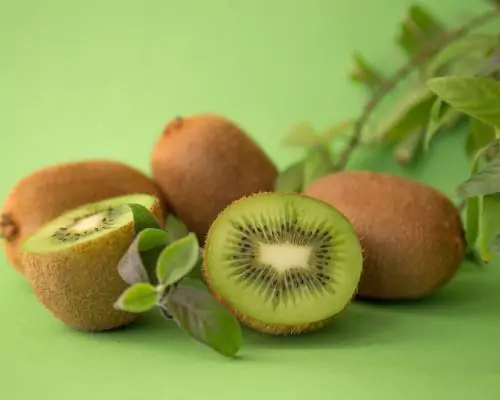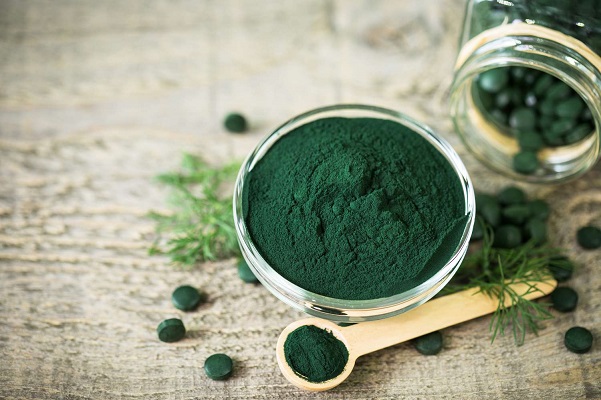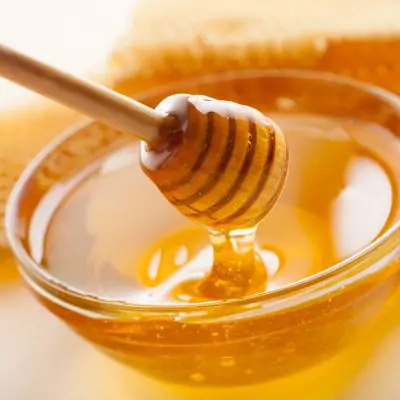On This Page
Overview
Although kiwi fruit isn’t frequently referred to as a “superfood,” it contains several essential vitamins and minerals and can improve your health. These dark fuzzy fruits feature green interior flesh that gives them a distinct flavor and tropical zing. They taste sweet and somewhat acidic.
A wide variety of nutrients, including fiber, folate, vitamin C, copper, antioxidants, vitamin E, potassium, and vitamin K, are present in kiwis. Although the skin and seeds can be eaten, many people prefer to peel the skin off because of its fuzzy texture.
Kiwis are hardy fruit that is widely accessible all year long in shops.
They are raised in New Zealand from June to October and in California from November to May.
Synonyms of Kiwi
- Chinese gooseberry
- Kiwi vine
- Actinidia chinensis
- Actinidia deliciosa
Nutritional Facts of Kiwi
| Calories: | 64 |
| Carbs: | 14 grams |
| Fiber: | 3 grams |
| Fat: | 0.44 grams |
| Protein: | 1 gram |
Phytochemical Constituents of Kiwi
- Epicatechin
- Quercitrin
- Rutin
- Catechin
- Chlorogenic acid
- Ferulic acid, and vanillic acid.
Therapeutic Uses of Kiwi
- Can Help Asthma
The effects of asthma can be severe. Some of the most typical signs and symptoms of this illness include wheezing and shortness of breath.
Kiwi’s abundant vitamin C content and antioxidant content can help manage asthma symptoms.
- Fights Inflammation
Kiwi’s contain the enzyme bromelain, which can break down proteins and reduce inflammation. Bromelain is discharged into the bloodstream after kiwi consumption, where it damages inflammatory mixtures.
- Prevents Vision Loss
Kiwis can stop macular degeneration, which eventually leads to vision loss. Zeaxanthin and lutein, called the “eye vitamin,” are both found in kiwis.
These two substances serve the same purpose as antioxidants and contribute to the formation of vitamin A, an important nutrient for your eyes.
- Helpful for Skin
Kiwi is a naturally occurring source of vitamin C, which may function as an antioxidant and may aid with sun damage to the skin, wrinkles, skin vibrancy, youthfulness, and texture. Collagen is also created by vitamin C, which could aid in skin allergy. It might also speed up the healing of cuts and wounds on the skin.
- Cancer
Antioxidants, vitamins, carotenoids, and fiber included in kiwis may aid in the recovery from cancer. Studies suggest that the dietary fiber in kiwis may help reduce the incidence of colon cancer. It has catechin, which may lessen the side effects of anti-cancer medications and promote bone marrow proliferation.
- Cure Flu and Fever
Vitamins C and E, two potent antioxidants, are abundant in this sweet, green fruit. Vitamin C is quite potent. It is crucial to preventing a cold or flu in the first place in addition to aiding in their recovery. White blood cells and antibodies are produced more frequently when vitamin C is present, aiding in the fight against illness. Immunoglobulin synthesis necessitates vitamin E. These serve as the body’s own personal bodyguards, eradicating any infections that attempt to harm us.
Home Remedies Kiwi
- Glowing Skin
Your skin can gain a natural glow with the aid of a full-fledged vitamin C face pack that also contains the benefits of lemon and kiwi. Use a cotton pad to apply the mixture of fresh lemon juice and kiwi fruit pulp to your face as directed. After 20 minutes, rinse it off with water.
- For Smooth Hair
Because kiwis are so healthy, they act as a natural moisturizer and revitalize your hair while preventing frizz. It also has several vitamins that can help heal hair damage. Two ripe kiwis that have been peeled and a few drops of water added should be blended. Until smooth, blend. Apply liberally to the scalp and hair. After letting it sit for 25 to 30 minutes, wash it off.
- For Anti-Aging
Avocado, kiwi, and honey should be thoroughly combined. After 15 minutes, apply to the face and rinse with warm water. The anti-aging benefits of this pack will help you to slow down the aging process.
- Fights Acne and Pimples
The kiwi fruit’s AHAs and anti-inflammatory characteristics aid in the treatment of acne and shield your skin from future outbreaks. Lemon, on the other hand, has antimicrobial qualities that prevent acne and pimples. 2 tbsp of kiwi pulp and 2 tbsp of lemon juice should be combined in a bowl. For around 20 minutes, apply the mixture to your face. With cold water, rinse it off.

Have A Health Issue?
Consult Online
- Dr. Sahil Gupta (B.A.M.S., M.H.A.)
Ayurvedic Allergy Specialist
CEO & Founder of IAFA®
Ayurvedic Aspects of Kiwi
According to Ayurveda, fruits are priceless gifts from nature that should be a regular part of our diet. Kiwi is undoubtedly one of the world’s best fruits because it is so flavorful, attractive, and healthy. Vata is calmed by Kiwi fruit, whereas Pitta and Kapha are intensified.
Daily Dose: Due to its health advantages, everyone should consume at least one kiwi fruit every day.
Side Effects of Kiwi
- Allergic Reactions
Consuming kiwi fruit could cause adverse responses in some people. It is crucial to use caution when eating it. Numerous people who regularly ate kiwi fruit have complained of cross-sensitivity and food allergies.
- Rashes And Swelling
Studies have revealed that consuming too many kiwis can result in edema. People who consume too many kiwis can also develop anaphylaxis. Hives, asthma, and rashes are also frequent. Additionally, it could irritate the immediate oral area.
- Oral Allergy Syndrome (OAS)
The overconsumption of kiwis has led to many reports of Oral Allergy Syndrome (OAS). Mouth, lip, and tongue swelling are symptoms of OAS. Additionally, it causes stinging and itching in the tongue.
- Dermatitis
People who regularly consume large amounts of kiwis run the risk of developing skin conditions including dermatitis.
- Pancreatitis Problem
Acute pancreatitis can result from eating too many kiwis. This delicious fruit is fortified with vitamin C and E, potassium, and serotonin. High doses of these substances can change blood triglyceride levels, which may eventually cause injury to the pancreas.
- Latex Allergy
According to studies, the majority of those who have latex allergies are also at risk of having kiwi allergies. Kiwi and goods containing kiwi should not be consumed if you have latex allergies.
Conclusion
In addition to being tasty in fruit salads, smoothies, and as a snack, kiwis are also a great source of fiber, vitamins, minerals, enzymes, antioxidants, and other nutrients. For our health and the best possible operation of our bodies, all of these nutrients are necessary. As a result, kiwis are useful for boosting the immune system, controlling blood pressure, and even treating conditions like asthma and macular degeneration.
If you feel any side effects from kiwi must consult a health expert. You can also consult Dr. Gupta at IAFA® if you have a kiwi allergy he treats allergies through ayurvedic herbs and medication.









